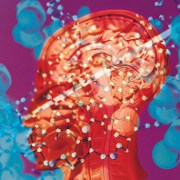 Photo: Getty Images
Photo: Getty Images
The majority of headaches are not dangerous, however, it helps to know the signs and symptoms of potentially dangerous headaches so that you can seek medical help promptly.
One type of dangerous headache is caused by viral encephalitis. The term "encephalitis" comes from the Greek word for head, enkephalos, and "itis" means inflammation so "viral encephalitis" is a brain inflammation caused by a virus.
Examples of different types of viruses that can cause viral encephalitis are:
• Herpes Simplex viruses – these are the most common types of viral encephalitis
• West Nile Virus
• Japanese Encephalitis
• Dengue fever
• Influenza viruses
• Rabies virus
• Mumps virus – mumps encephalitis usually resolves without any complications
• Echo Virus
• Coxsackievirus
• Viral meningitis – this is usually mild and resolves without complications
Some encephalitis causing viruses are transmitted via mosquito bites.
Sometimes viral encephalitis can occur as an immunological complication of vaccination as the immune system attacks central nervous system antigens that resemble proteins of the infectious illness. This is more common with live virus vaccines.
Symptoms
The initial symptoms of viral encephalitis are headache, stiff neck and fever. The headache can be severe. Lethargy, drowsiness and confusion can then develop.
The person may have speech difficulties, coordination difficulties and alterations in their behavior. They may suffer a seizure or go into a coma. In some cases, encephalitis can be fatal.
If you or a loved one has a severe headache, accompanied by changes in levels of consciousness and/or unusual behaviour you should contact a doctor or the emergency services immediately as encephalitis is a medical emergency.
Symptoms in Infants and Children
Symptoms in infants may be slightly different to those in adults. Their encephalitis usually begins with fever. Other symptoms are:
• Irritability
• Being fussy
• Refusal to breast feed or have a bottle
• Vomiting
• Bulging fontanelle (soft spot on the baby’s head)
• Crying when picked up (because they have a headache and the movement hurts their head)
• Seizures or strange movements
• A high pitched cry
• Infants and children who have severe encephalitis may become drowsy or unconscious.
The condition can cause death or permanent disability including seizure disorders, hearing loss, blindness, weakness of a limb, or mental retardation. It may not be obvious how the infant was affected until he or she is older and neurological tests can be carried out.
Sometimes neurological effects can be temporary and if the encephalitis was mild, a full recovery with no complications is possible.
If your baby shows any of these symptoms, you should seek advice from your paediatrician or local emergency room.
Treatment
Treatment for encephalitis involves intensive care to support the patient’s airway and bladder function and nutrition. Some patients don’t require help with breathing but may need to be given fluids to help stabilize them.
If seizures are occurring, anti-seizure medications will be given. If the encephalitis has been caused by herpes simplex virus, an anti-viral drug called acyclovir can be given.
Prompt diagnosis and treatment is important to increase the chances of survival and minimize the chance of disability, so don’t be afraid to ask your doctor about any unusual headache, it may save your life.
Sources:
Viral Encephalitis, Medscape Reference. Web. 7 February 2012. http://emedicine.medscape.com/article/1166498-overview
Encephalitis, The Merck Manual. Web. 7 February 2012. http://www.merckmanuals.com/professional/neurologic_disorders/brain_infections/encephalitis.html?qt=viral%20encephalitis&alt=sh
Viral Central Nervous System Infections in Children, The Merck Manual Home Health Handbook. Web. 7 February 2012. http://www.merckmanuals.com/home/childrens_health_issues/viral_infections_in_infants_and_children/viral_central_nervous_system_infections_in_children.html
Joanna is a freelance health writer for The Mother magazine and Suite 101 with a column on infertility, http://infertility.suite101.com/. She is author of the book, 'Breast Milk: A Natural Immunisation,' and co-author of an educational resource on disabled parenting.
Reviewed February 7, 2012
by Michele Blacksberg RN
Edited by Jody Smith






Add a Comment1 Comments
Untreated Herpes Simplex Encephalitis has an extremely high mortality rate at about 70% with fewer than 3% of survivors returning to normal function. Please don't say that acyclovir "can" be given. It MUST be given to cease the progressive nature of HSE.
Wendy Station, survivor, HSE 1999
February 8, 2012 - 10:57pmPresident, Encephalitis Global, Inc.
http://www.encephalitisglobal.org
This Comment